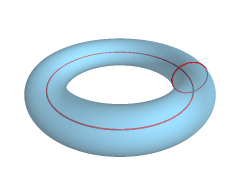|
(2015
midterm assignment) Model Student Midterm answers 2015 (Index) Essay 1: Compare, contrast, and evaluate Narratives of the Future |
 |
Cynthia Perkins
Where Do We Go From Here?
Science-fiction has always created for its readers endless possible futures.
These scenarios can be entertaining, but can also offer us glimpses
of how our past and present will determine our fate.
These thought-experiments allow us to safely explore what political,
social and technological changes will benefit us or lead to our annihilation.
The different narratives we read this semester allowed us to see humanity’s
future in several different ways.
Genesis
and Revelations is a text Westerners
believe they understand, because so many of us have been exposed to Christian
teachings and the Bible. Reading it as literature, however, offers a whole new
way for us to look at the world we live in. We, as humans, understand the
concept of birth and death very well and so texts such as
Genesis and
Revelations, offer us a linear
version of the future we can comprehend.
We
can understand that God is the “Alpha
and Omega, the beginning and the end” because we have a beginning and an end
(Rev. 21:6).
It’s also easy for many to believe that
the world we live in was once better, as in
Genesis, and that humanity is in a
constant state of decline. Revelations,
however, promises that God will
“make all things new”
if we just have patience and faith (Rev. 21:5).
In this way Genesis and
Revelations follow the romance
narrative. The world has been corrupted, but if obstacles are overcome and
tribulations survived, the perfect world will be restored. Whether a person
believes these biblical stories to be true or not, they reflect and inform our
understanding of who we are, where we have been and where we might end up.
Charles Darwin’s On the Origin of Species
introduced evolutionary theory to the world in 1859. This offered a whole new
way to look at life. Rather than have a definite beginning and end, we are part
of a process in which decline and progress are constantly cycling. What may be a
decline for one species, group or individual, may be progress for another. This
concept can also be applied to society on the whole. Octavia Butler’s
Parable of the Sower, is interesting
because it uses the model of
Genesis/Revelations while simultaneously presenting the world in Darwinian
terms. Society is in decline, food and water are scarce and therefore expensive
and the United States has been reduced to the state of a third world country.
Inevitably, there is an apocalypse when
Lauren’s community is destroyed and most of her neighbors are massacred.
However, she survives, not because she has faith that God would deliver her, but
because she is intelligent and diligent enough to realize that if she does not
adapt her behavior to meet her circumstances, she will die. Interestingly, her
world is in decline because of the progress humans have made in technology which
exacerbated climate change. As the environment fails and the struggle for
survival grows more intense, only those who adapt to a new way of life can
survive and will eventually pass these traits onto their young. This story
reminds us that if humans want to live to see the future, they will have to
learn to adapt and evolve, socially as well as physically, just like all other
living organisms on earth.
H.G. Wells,
Time Machine is another example of
the evolutionary process at work. The Time Traveler, through a series of
scientific observations, theorizes “that
Man had not remained one species, but had differentiated into two distinct
animals” due to “the gradual widening of the present merely
temporary and social difference between the Capitalist and the Laborer” (5.33,
38). He extrapolates from observing his own time
period that social-economic inequalities have led us to this strange future. Out
of necessity the Morlock’s, who symbolize the lower working class during
industrialization, have adapted to their subterranean environment and have been
eating of the child-like nature of the Eloi, who represent the upper class, in
order to survive.
When the Time Traveler finally escapes this unnerving world and travels into the
far future, we see yet another glimpse of our fate that reminds us we are only
one small part of nature. Eventually, like all species on earth, we will either
adapt and evolve to the ever changing environment or we will cease to exist.
Other species will rise in our place and the earth will live on without us. This
is starkly different than the imagery of
Revelations in which it is the earth that is destroyed and it is we that
survive and prosper. Both of these
possible futures are out there on the horizon along with countless others.
Quantum
physics and the many world scenario is an even newer scientific theory that many
of us are still not completely familiar with or even comfortable with. The
concept that there may be infinite realities and many futures is both
entertaining, enlightening and a bit disturbing.
Bruce
Sterling and Lewis Shiner’s
Mozart in
Mirror Shades
shows us just one possibility of how this might work. In this story, though they
can travel back in time, each place they travel too will branch off and create a
different future than their own. This creates a frightening scenario in which
there are no consequences for their actions in their own time. This story seems
eerily familiar as the industrial world often travels to countries in which the
society is not as advanced, brings the people modern technology that does have
benefits, but ultimately destroys their culture. This alternative future
narrative is another example of how science-fiction can stretch our imagination
and try to understand other cultures, beliefs and even genders and predict what
futures may result from our interactions with each other.
Humans have not quite figured out how to time-travel so we only have texts such
as these to help us imagine our possible futures. The fact that humans can think
into the near as well as far future will hopefully allow us to make changes in
our negative behaviors now so that we may not go extinct due to mistakes we may
be currently making. Rachel Jungklaus
said this very well in her essay
Alternapocalypse or
Altevolution
when she stated “we need to learn not only from our own mistakes, but
from others mistakes as well. Just because their mistakes are fictional does not
make them any less valid. All of these stories are alternative futures for us.”
 |
 |
 |
